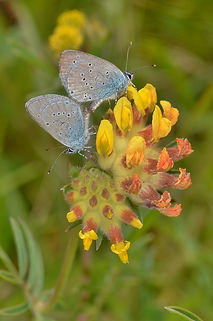
Ashley Whitlock
Hampshire & IOW Butterflies and Moths

Deacon Hill as seen from Magdalen Hill Down, showing they are not that far away from each other!
Deacon Hill NNR
.jpg)
Small Blues mating on Kidney Vetch
.jpg)
Wild Thyme grows on the ant hills

There is a small population of the Duke of Burgundy on Deacon Hill NNR management should help it in its recovery

Pyramidal Spotted Orchids are very common on the site

Marbled Whites mating on Knapweed
%20(1024x683).jpg)
The Mother Shipton moth is another moth which is declining at certain sites.
Deacon Hill – a new nature reserve for Winchester, Hampshire & Isle of Wight Wildlife Trust
Hampshire & Isle of Wight Wildlife Trust is delighted to add another site to the network of nature reserves and wildlife areas it owns and manages around Winchester. Deacon Hill was secured thanks to gifts in the Wills of two local women, Heather Monie and Shirley Bull, and over 1,600 donations from individuals, local companies and organisations, as well as grants from Hampshire County Council, the Calleva Foundation and South Downs National Park Authority.
Deacon Hill is a 10 hectare patchwork of scrub and chalk grassland in the South Downs National Park. The nature reserve perches at the highest point of the chalk scarp (a steep chalk slope) to the east of the city, overlooking the Chilcomb Valley. Over half of the world’s chalk grassland is found in the UK, and a significant amount sits right on our doorstep in Winchester. Chalk grassland is widely regarded as one of the richest habitats in Europe, but it is under threat from damaging agricultural practices and invasive scrub, so the Trust is delighted to be able to protect this site into the future. Deacon Hill is particularly noted for its population of Duke of Burgundy butterflies. These fabulous little butterflies have declined drastically in recent decades, so the opportunity to protect one of their last remaining strongholds was too good to miss.
Since the purchase was completed back at the beginning of May, work has started on the site to improve the habitats for the wildlife that lives there. The Trust’s ecology team has begun the baseline surveys needed to help determine future work, with the first bird surveys clocking up 21 species, including blackcap, whitethroat, yellowhammer and green woodpecker. Duke of Burgundy butterfly eggs were found across the site, and lots of adult butterflies have been spotted on the wing. During their visits, the team also came across flora such as broomrape, common spotted and pyramidal orchids, and many insects including bees, butterflies and common green grasshoppers.
If you are one of the many who donated to the recent appeal to buy Deacon Hill Nature Reserve, Hampshire & Isle of Wight Wildlife Trust would like to say thank you. Thanks to your support, the Trust successfully managed to realise a long-held ambition to own and manage this wonderful piece of land. A true investment in a wilder future for Winchester residents, both human and wildlife!

Wildflower meadows are important habitats for many types of flora and fauna
.jpg)
Burnet Companion moth is well established on the site